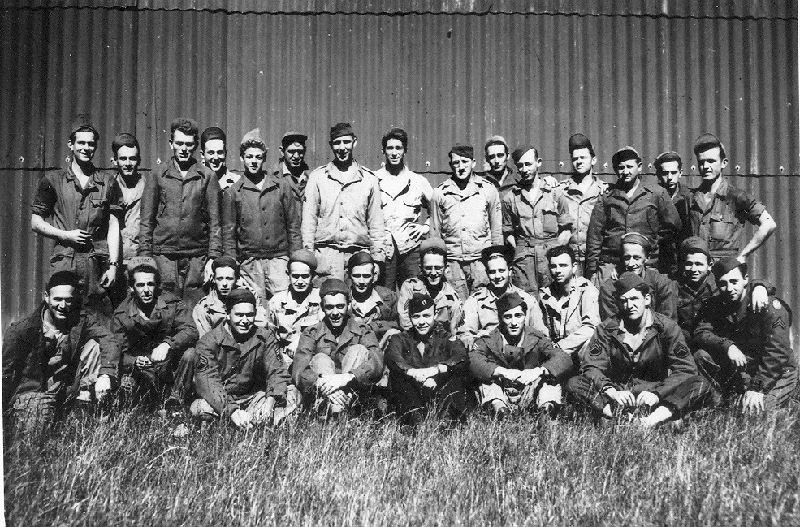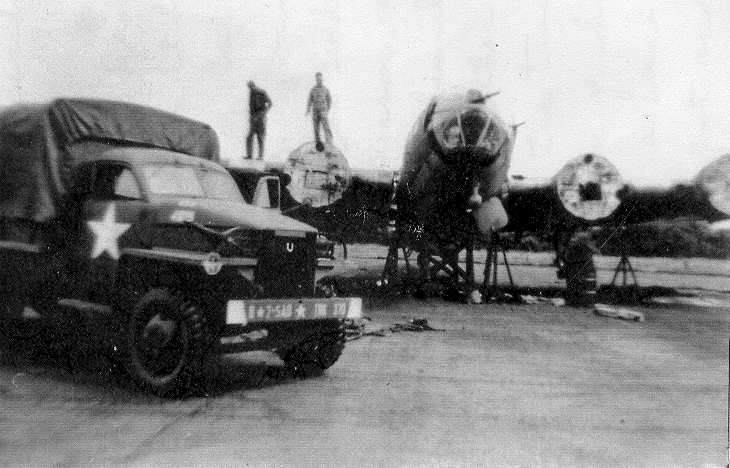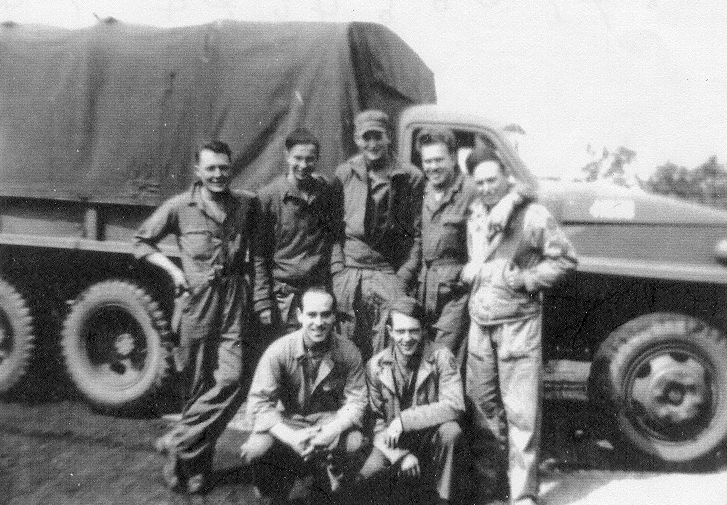Sometime in the middle of 1944, after we had the Supply Depot set up at Abbots Ripton, the 2nd Mobile Repair and Reclamation Squadron was given a new assignment.
Any B-17 Bomber that made it across the English Channel and landed anywhere except at an American case our Squadron has assigned to that aircraft. If it could be repaired and have enough room to take off, another squadron would repair it. If the B-17 could not be repaired our squadron was assigned to dismantle it or take it apart. We were careful in taking it apart because any part that was good was used again It was in these trips all through England that I saw and was involved in enemy action.
How most of these B-17s made it across the channel is a mystery to me. Engines were shot off; wings had large holes in them; tail assemblies were shot to pieces; large holes were in the fuselage of the plane; gunner and cockpits were all shot up. I say shot up but some of them were damaged by flack.
D-Day plus 2 we were working on a B-17 that had just made it across and over the Cliffs of Dover. We could see a little action but not much across the Channel.
Several times we stayed on English Air Force Bases. We ate in their mess halls and shared rations with them. Most of the English made us feel at home. However some resented us being there.

Standing (Left to Right): Pvt. Al Luks (Brooklyn), Sgt. Homer Fleury (Boston), Pvt. Jim Markgraf, Cpl. Wheeler, PFC Bill Deangler (Blatimore), Pvt. Galbreth, Sgt. John Crolius (New York), Pete Bohn (PA), Sgt. Bernard Fay (Chicago), William Geurnick (MA), Sgt. Oliver Gifford (WA), Lewis Owens (KY), Cpl. Ed Kostanski (Chicago), Pvt. Jim Thomas, Cpl. John Perkovich (MI)
Kneeling: Cpl. Clayburn Longino (TX), Pvt. A. Taley, Pvt. Joe Solinski (Chicago), Pvt. M. Norman, Pvt. Keto Gentry, Sgt. Louis Gerstle (Louisville), S/Sgt. Edward Young (MD), Pfc. Carl Hagel (CA), Cpl. Tom Stapleton (Brooklyn), Pvt. Al Koch, Cpl. John Cogliandro (NY)
Sitting: T/Sgt. Ruben Draper (TX), T/SGT. Dan Tittnich (PA), Capt. H. Bryant (OH), S/Sgt. Jack Davis (NC), S/Sgt. William Gardner (MD)
We stayed overnight quite a few times in London. The Germans usually sent the bombers over at night. Most all of the children of London were sent to safer places. The English that lived and stayed in London went every evening into the underground stations (Subway). Beds were set up in tiers of 5 or 6. They brought their blankets and personal items with them and slept there all night safe from the bombs.
We were in London several times during the fire blitz. These are the times that the Germans dropped incendiary bombs in their attempt to burn down London. The Home Guard did an excellent job in containing these fires. Several times we saw whole blocks burning. We also saw a lot of burning around St. Paul's Cathedral.
The English couldn't understand why the GIs hardly ever went into a bomb shelter during an Air Raid.
The Germans lost heavy in aircraft during these raids. We saw many a German shot down by Anti-Aircraft fire. The Germans also had heavy losses from being shot down by the Spitfire fighter of the English Air Force.
Of all the American Air Bases that I visited I don't remember a one of them being bombed. I don't understand why the Germans bombed London and other towns and not the Air Bases.
My memory fails me as to dates but the Germans were now sending over what was called the V-l bombs. These were pilotless aircraft that had just so much fuel in them As long as the robot plane was flying and you could hear the engine running, no worry. As soon as the engine stopped you must dive for shelter. You had to go to an Air Raid Shelter or Underground entrance or some other safe place. When the V-l stopped it went into a tail dive and when it hit the ground or an object, it was a destructive bomb.
After this the Germans began to use another type of bomb. It was called the V-2. This was a rocket bomb. It hit without warning. We saw a few of them hit targets, and they were very destructive.
One V-2 that I didn't see knocked me out. This happened in London. It was a Sunday morning; I was on my way to Mass. The only thing I remember was being picked up by several Englishmen. Glass was all around me. Ambulances, home guards and fire equipment were all around They Just asked me several questions and released me. I know one thing I almost ran to church to hear Mass after this near miss. I know several were killed by this bomb and there was quite a bit of damage in the area where the bomb hit.
If a GI would try to walk around Piccadilly Circus - before he would have walked half way around - a young lady would have him by the arm and say something like "Hey, Yank, show you a good time tonight for 10 Shillings" or all night for a Pound.
Spamland - this was one of our names for England. Why? Spam was served In every way possible at many of our meals an the Mess Hall. Among the ways it was served were out of the can fried with a dipping of some kind and any other way the Mess Sergeant could think of.
It seems that Brussels sprouts were served at least once a day. Powdered eggs were served at practically every breakfast Another staple item was what we called SOS - something like hamburger served on a piece of toast with gravy over it.
We always got plenty of food - maybe not what we liked, but we did not starve. Of course, on Thanksgiving and Christmas we were always served turkey with all the trimmings.
After working In the supply warehouse for a few months, I was transferred to another job which I kept until we left England. This consisted of salvaging B-17s when they came back from bombing raids If the 17 was too badly shot up and damaged, we took It apart. We worked on planes all over southern England Most of the planes were in places that even though they could be repaired, there was not enough room for them to take off. We worked on planes at various American and English airports as well as in open fields.
On D-Day+2 we were working on a plane than Just made It over the Cliffs of Dover. It stepped just 100 or so feet from the edge of the Cliffs. We saw a lot of ships going from Oakland to the beaches in France since it wasn't far across the Channel to see what was going on. Most of the parts that we took off the B-17s were used over as there was a shortage of some parts especially the self- sealing wing fuel tanks.
I did get into a little bit of trouble one weekend in London. I was stopped by two MPs. They asked, among other questions, to see my dog tags. Now we were supposed to wear them around our neck. My dog tags of course were in my pocket, not around my neck. The MPs took my name, army serial number and where I was stationed. Several days later I was told to report to Major Hurst's office. At the time I didn't know why. I reported to Major Hurst's office. He informed me of the report of the MP's in London. He more or less told me to always wear my dog tags around my neck and not in my pocket. He then dismissed me, and that was the end of that.
Working at Abbots Ripton

